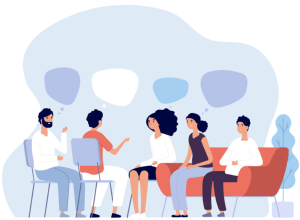Working with Veterans: Fellowship
Military veterans are a growing population among undergraduate and graduate students. They are characteristically driven to succeed and accomplish the mission assigned to them, reflective of the discipline and responsibilities they experienced in service to their country. Some of these troops have sustained injuries or developed cognitive or sensory disabilities through their tours of duty in war zones, but this does not mean they are any less able to succeed.
Ensure that any Veteran seeking to access their benefits has a copy of their discharge paperwork (Defense Department form 214/DD-214). This paperwork serves as an account of the Veteran’s service, including deployments, awards, training, and discharge status. The DD-214 can be accessed through the use of milConnect.
Camaraderie and Purpose
Veterans have lived in and managed a system that relies on everyone carrying out their individual roles within a larger organization to accomplish a set mission. When someone works, lives, and plays among a group of like-minded people, friendships and social capital are easily built. Through the course of deployments and training, these bonds are strengthened to the extent that the unit becomes a second family.
However, when a troop is discharged, they may experience a loss of that sense of belonging. Becoming an active member of one or more Veteran Service Organizations can serve to not only rekindle that sense of camaraderie, but also provide the Veteran with a newfound sense of purpose.
Educational settings like classrooms and labs can help forge this sense of belonging and community too, as can programs like internships and apprenticeships. Helping these students learn about, and take advantage of, campus services and other opportunities can help veterans feel more connected to campus life and their educational pathway. Some possible campus services include:
- Clubs or campus groups, related to the student’s academic or personal interests
- Workplace based learning opportunities
- Support groups for veterans or other support groups applicable to their situation
- Tutoring or mentoring groups, which they may utilize by being the mentor or the mentee depending on their background and needs
Beyond the options offered in educational settings, other options within a veteran’s community might include, but are not limited to:
- Community service or volunteering
- Socializing/activities with coworkers or other students
- Physical activities, such as joining a gym, taking a class, or joining a recreational sports group
- Continuing education classes, such as learning a new language, skill, craft, or hobby
- Hobby groups, such as knitting circles, tabletop game groups, book and/or film clubs, or music groups
- Religious or spiritual groups
- Peer support groups that encourage meeting routinely with other local veterans
- Online video game communities
Finding supportive communities can be vital to a veteran’s mental health once they’ve been discharged. In addition to socializing, physical and creative activities can become important outlets for stress, caused by experiences both during and after service. Understanding what services are available for veterans and other students on and off campus can help support them during their education and as they transition back into the workforce.
Additional Resources
- US Department of Defense Veteran Support Organizations
Printable (PDF) Version of Tip Sheet
Developed in conjunction with Human Engineering Research Laboratories (HERL), based at the University of Pittsburgh.